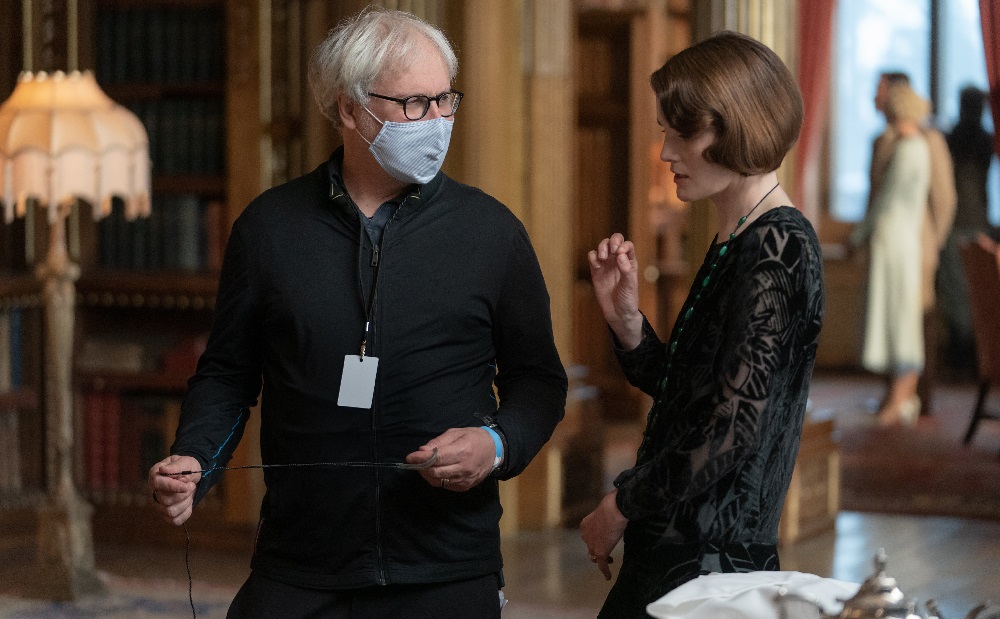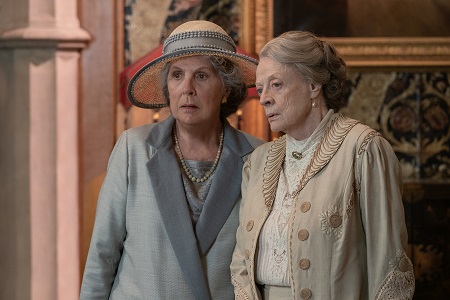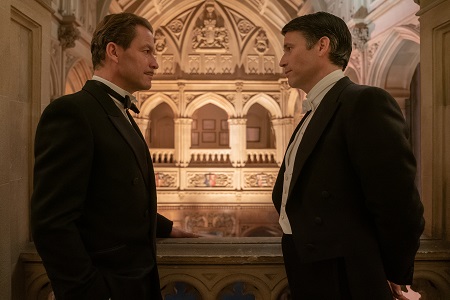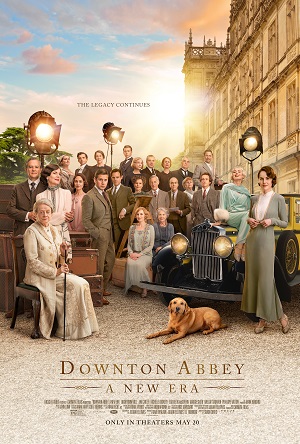
“Downton Abbey: A New Era” – Interview with Simon Curtis
by Sara Michelle Fetters - May 20th, 2022 - Interviews
Filmmaker Simon Curtis Takes Downton Abbey into a New Era
Simon Curtis is no stranger to the world of Downton Abbey. Still, even with his wife Elizabeth McGovern playing the key role of Lady Cora Grantham, the director of My Week with Marilyn, Woman in Gold, and Goodbye Christopher Robin — not to mention popular BBC productions like Cranford and 1999’s David Copperfield — has kept his creative distance. Until now.
Inspired by creator Julian Fellowes’ screenplay, Curtis has taken the reins of Downton Abbey: A New Era, and his presence his immediately felt. In this follow-up to the 2019 hit — itself a big-screen continuation of the long-running BBC television series — there is a noticeable uptick in emotional clarity that I found mesmerizing. The upstairs-downstairs melodramatics at Downton haven’t felt this invigorating and, dare I say it, joyous in quite some time, making this a superior sequel and one of the more effortlessly enjoyable films I’ll likely see this summer.
I caught up with Curtis over Zoom for a quick chat about the latest goings on at Downton Abbey. Here are the edited transcripts of our brief conversation:
Sara Michelle Fetters: I can guess why you are interested in Downton Abbey, but I would never want to presuppose. So what was it that drew you to this second film?
Simon Curtis: I liked the script. That’s just been the guide for every film I’ve done. And, obviously, there was the attraction of working with these actors. Also, not least of all, it got me out of lockdown.
SMF: My chief criticism of the first film is I felt like it was trying to cram an entire season of plot lines into one movie. I still liked it, but I felt like it was still overstuffed. I did not feel that this time around. Julian’s script was very focused, and I liked how there were these concise dual plot treads that were working with one another, so they could build toward a satisfactory conclusion.
SC: I liked the script, and you try and make every scene work as well as possible, and then you splice them all together and hope the film is greater than the sum of its parts. Do you know what I mean? I take my hat off to Julian, because he manages to write all the 20 stories of these characters with such consumer skill.
It’s the film I hoped it would be. It’s sort of a wonderful escape for two hours from this wretched world we’re living in, and it makes you laugh and it makes you cry. What more can you ask?
SMF: It’s fascinating to me that, in your prior motion pictures, yes, while they are technically ensembles, they’re also focused down to just a select few characters. In this one, I wonder, did you have to draw on your theater background in order to work with such a giant ensemble?
SC: That’s a smart question. In fact, what I drew on was the David Copperfield I did at the BBC with an ensemble as great as this one, including Maggie Smith and Imelda Staunton; or Cranford, which included Jim Carter and Michelle Dockery and Judi Dench. Those big British ensembles were the perfect training for this.
SMF: What sort of instruction do you give your cast? Most of them are so used to these characters at this point. Is the direction you give to say, Maggie Smith, who has played her character for such a long time, different than what you give Hugh Dancy, who is coming into this world for the first time?
SC: What people don’t often say about directing is that every actor has a different version of how you can help them do their best work. Sometimes that’s to say nothing. Sometimes it’s to give a thousand notes. You just go through all of that. But, obviously, you take into account and benefit from, in this case, the fact that the actors know their characters so very well. That makes my job a lot easier.
SMF: By sheer happenstance, I watched the new 4K release of Singin’ in the Rain literally the day before I watched this movie. Do you think people will notice some of those parallels?
SC: They have noticed that, but it’s annoying to me, because in fact, this idea comes from the Alfred Hitchcock film Blackmail made in 1929, which our producer Gareth Neame’s grandfather, Ronald Neame, was the assistant director on. That film, which you should also watch, is literally shifted from silent to sound, and on the DVD, you can see some scenes done in both ways.
SMF: That was actually going to be my very next question. You appear to call and reference Hitchcock a little for some of these set pieces, or do I have that wrong?
SC: You do not. It’s why I prefer to talk about Blackmail instead of Singin’ in the Rain when people make the comparison.
SMF: Switching gears, I have to imagine that this was really exciting for Michelle Dockery, because this is sort of an exciting expansion of Lady Mary’s character. She gets to do so much in this film.
SC: Yes. It is. I think it’s lovely to see Mary doing a job so well and getting so much pleasure from that. I know Michelle felt that as well.
SMF: I think I could feel that, too. I guess that’s maybe why I loved this sequel so much. It’s infused with joy. Even when we’re dealing with the serious and the dramatic parts, or the stuff that’s supposed to have you reaching for your tissues, there is this all-over sensation of joy. I’m not sure these characters have been afforded the opportunity to universally feel that in quite some time.
SC: That’s good to hear. Thank you. I’d like to think I bring a warmth and positivity to my films, and it seems to be just a very happy marriage in this instance.
SMF: You mentioned earlier that one of the reasons you were eager to make this film is that it got you outside again. But you were still making this motion picture in the middle of a pandemic. Were there difficulties that you hadn’t anticipated? Were there any roadblocks?
SC: The biggest difficulty was we didn’t know if we were going to be able to get to France or not. We had to prep UK alternate locations for all the French locations in case we couldn’t get there. This was very time-consuming and depressing, because a park in West London doesn’t look to me like the French Riviera.
But at the end of the day we did get to France. So that was very exciting.
SMF: The day in the south of France when Jim Carter showed up in his full British butler uniform — did everybody on the set giggle as much as I did in the theater? Such a splendid moment.
SC: Yes. [laughs] Yes they did. And he generally was very hot. I don’t think he needed to act that.
SMF: I don’t want to go into it in detail, because we don’t want to spoil anything for the audience, but you and Julian do give Cora a wonderful plot arc. Personally, how nice was it that you were able to give Elizabeth more to play than I think she’s gotten from her time in Downton Abbey for quite some time?
SC: Truthfully? It was nice. That was one of the things on my checklist. One of the things while reading the script I knew needed to be there before I decided to sign on.
SMF: Is it hard, though, when you’re dealing with some of these — I don’t want to call them Douglas Sirkian melodramatic moments, but in some instances that’s exactly what they are — how do you ensure they feel authentic and the audience doesn’t look at them as if they were contrived or clichéd?
SC: I like the Douglas Sirk reference. As a director, you are given hundred or so scenes and you just have to make every one of them as good as possible. If it’s about making something emotional, something real, that’s the task of that day. You just hope for the best. With these actors and this writing, it came out good most of the time.
SMF: For obvious reasons, Maggie has a few incredible moments. You’ve worked with her in the past. How does it feel as a creator, as an artist, to watch somebody with that much talent and that much history, an icon, if you will…
SC: It’s great. I really like that question, because I would say watching Maggie Smith on the monitor is as good as it gets if you’re a director.
SMF: For everybody else, though, do you ever find that — especially when you have a cast this stacked and this incredible top to bottom — people start watching the other actors and they forget to perform themselves?
SC: I don’t know. As you said, they’re all so talented, so if it happened I can’t say I was able to tell. But Dominic West said his first day on set with Maggie at that dining table was the best day of his life. I could understand that.
SMF: Speaking of Dominic, I would be remiss if I didn’t talk a little about the subplot involving him and Robert James-Collier. Again, I don’t want to ruin anything for people that are going to be coming to this one fresh, but I love that that storyline concerning their two characters is era appropriate.
SC: Exactly. I mean, it’s sort of in code, right? But erotically charged as well.
SMF: Definitely. For Robert, who has in the past said that sometimes he’s not necessarily always wanted to keep coming back to Downton Abbey and playing Thomas, this had to be exciting. His character gets a rather meaty subplot.
SC: Yes. I believe it was. One of my favorite moments of pre-production was calling Robert up to tell him who’d been cast as Guy. He was ecstatic.
SMF: If the story of Downton Abbey were to continue, would you return to direct another installment?
SC: It’s the same as two years ago when it was first mentioned as an idea: let me read the script. If I loved the script, the same would apply. I’d happily return.
SMF: As I look at the films that you’ve made, there is always a humanistic component where you’re trying to find the heart of why people make the decisions they do and how that affects the people around them. Do you find that those scripts and those stories are getting harder to find now?
SC: I definitely do. I mean, I wish I was working when Douglas Sirk was working, because I’d be the top director in town. But I do feel the kind of films I want to make are happening less and less.
I’m very much driven by the scripts that I can get my hands on and the story. I love watching TV. I love going to the theater. I love film. If I’m lucky enough to keep working, I hope I get my hands on a few more great scripts.
SMF: I revisited My Week with Marilyn a little while ago, because we have that Andrew Dominik film that’s coming out for Netflix. I know this is off-topic and I apologize, but I was wondering, why do we still continue to have this obsession with Marilyn Monroe? Why are there so many stories and documentaries looking at Marilyn and her life?
SC: I don’t know. I mean, she’s a fascinating, underestimated woman, but I think it’s the power of the still photograph. I think that those photographs, those images of her beautiful face remain in the public eye, and that fuels the ongoing fascinating with her.
SMF: Bringing things back to Downton Abbey, why do you think this world that Julian has crafted has become so popular around the world? Why has it carried on?
SC: I think because he loves his characters and he treats them all with dignity and enthusiasm. And they’re portrayed by a brilliant ensemble of actors at their peaks.
SMF: Now that we’re hopefully coming out of this pandemic and able to go out and do things again, and considering this is a purely theatrical experience, what do you hope audiences are talking about when they leave the theater?
SC: I hope they’ve, for two hours, escaped this wretched world that we’re living in at the moment. That they have been reunited with some friends and their family, I hope they’ve enjoyed themselves. That’s really all I could hope for.
– Interview reprinted courtesy of the SGN in Seattle







